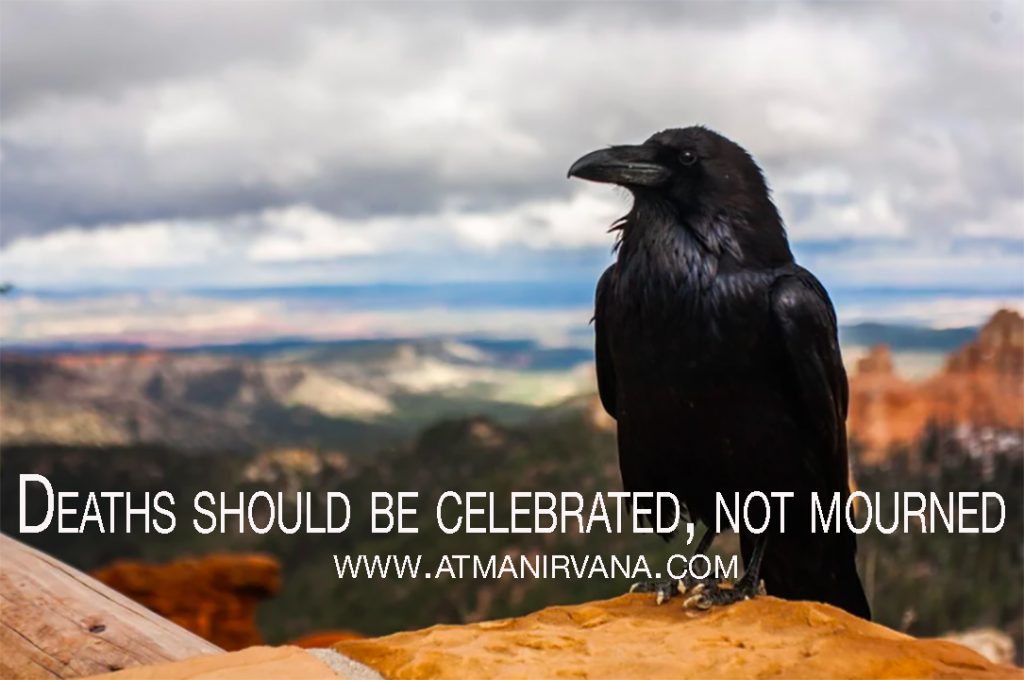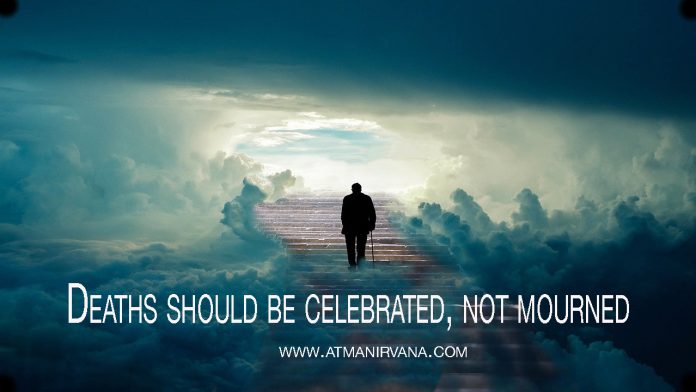Dying at a ripe old age is nothing but liberation
Our daily lives in Covid era are surrounded by deaths – of our near ones, someone whom we knew and some well-known figures. Death is inevitable. Death is indeed a loss, but when we are not able to say a final goodbye, our grief is compounded.
We all come with an expiry date written into our DNA and, come what may, we have to say a goodbye to the mortal body on that date. So, Covid aside, I come to the question: Should death be celebrated? More specifically, why not celebrate natural death?
The issue of celebrating death came to life recently when Indu Jain, the chairperson of the Times of India group, bid farewell to all her friends in a unique way telling them not to grieve, but celebrate her departure. Then again, well-known cardiologist Padmasri Dr KK Agarwal, in one of his final videos, repeated what the great showman Raj Kapoor had said: “The show must go on…picture abhi baki hain.”
In 1999, when the dashing cricketer ML Jaisimha was on the verge of death, he asked his friends not to mourn his death. Instead, on the 16th day, in place of the customary ceremonies to the departed soul, they should get together in a club, have a few pegs and enjoy themselves. If life is an enjoyment, death is a celebration.
Coming back to Indu Jain, she wrote a letter to her friends preparing them for her departure to the ‘other world’ and instructing them to celebrate her death.
She said: “Dying must be an extension of art of living…Like all mortal beings, there have been several occasions and reasons for feeling dissatisfied. But, on each such occasion, I asked myself, “is there any need to punish oneself with unhappiness?” The answer has always swiftly banished such negative thoughts. This is why I am certain that, as with the sojourn, the departure from life too will be amidst the surround-sound of pleasure, and more so, excitement…the last frontier beckons, demanding to be experienced. Of this, I am certain: the never-before destination, the great unknown will not disappoint. Everyone has talked of its mystery: us paar na jaane kya hoga, us paar jaroor kucch naya hoga. I can’t wait to explore it”.
And then she added a last wish: “If there is a last wish, it is this…No one needs to ask “where is Indu?” Because, wherever there is laughter, they will find her there”.

Embracing death is easy for those who have known the meaning of life and lived life in full measure. After having finished all His duties on earth and giving a finality to the curse that he welcomed, Lord Krishna waited for death, dangling His foot while sitting on a tree so that a hunter would mistake the feet to be that of a bird and release his poisoned- tip arrow. The hunter is full of remorse but the Lord tells him that His time has come and the hunter, after all, fulfilled his duty.
After Krishna’s departure, Vidhura, also known as Kshattri, the half-brother of Dhritarastra, has an important piece of advice. He asks his blind brother Dhritarastra how long he will be blind to the fact that there will be an end. Dhiritarastra gets the message and goes to the forest with his wife Gandhari and sister-in-law Kunti. A few days later, Dhritarastra senses (because he was blind, he had extraordinary powers in smelling and hearing) a huge fire approaching them and wants to flee along with Gandhari and Kunti. But then, Kunti asks him as to how long will he flee – meaning how long will he flee from death. All of them embrace death willingly.
Jains observe what is called Santara – a voluntary act to renounce life through fasting. I remember having witnessed Santhara when I was in Hyderabad. A lady, in all her finery, was sitting under a decorated dais ready for ‘departure.’ I asked her sons and daughters if they were not sad and worried. They unanimously said that their mother felt that she had fulfilled all her duties and had detached herself from life. She had given up everything. Time had come for her to give up her last breath. After she passed away, her near and dear ones celebrated her departure.
You May Like To Read; What Happened After Death in Hinduism?
In Kathopanishad, teenager Nachiketa confronts Yama – the Lord of death – on matters concerning death. A brief background: Nachiketa’s father Vajasrawas was performing Viswajet Yajna in which he had to gift valuable objects to holy men. Cows were categorised as valuable and Vajashrava decided to donate his cows to Brahmins. Nachiketa noticed that he was giving away only old and disabled cows that could neither give milk or bear calves.
In order to dissuade his father from giving away old cows, he asked,” O father, whom have you decided to give me away?”. At first Vajasrawas paid a deaf ear, but when Nachiketa persisted, the irritated father said, “Nachiketa, I give you to the God Death.” Since his father had decided to give him away to the God of Death, Nachketa goes to visit Lord Yama. For three days and nights the young boy waited without food, water and sleep at the doorstep of Yama’s abode. For having kept Nachiketa waiting for three days, Yama granted him three boons.
The first boom was: “I seek the welfare of my father.” After all, charity begins at home. Yama granted the boom to him happily.
Second: “Sir I desire to know how one could reach heaven where there is no sorrow, old age or death”. This boon was for the sake of the people. He wanted everyone to learn this secret knowledge and free themselves from the sufferings. Yama gave all the details of sacrifices (that can now be interpreted as things one has to sacrifice to attain liberation), the performance of which would take one to heaven.
Third: Nachiketa wanted to know the mystery of what happens after death.
Yama hesitated and said that this had been a mystery even to the gods. So he tells Nachiketa to ask for some other boon. The young lad refuses. Yama then tells him about the duality between the soul and the body. The body perishes after death, the soul gets liberated. The body enjoys life not eternally and death is a liberation.
Body is the seat of desire that perishes, the soul is immortal.
So how does one prepare to get liberated?
Some tips: When you have lived your full life, prepare for liberation. Snap all attachments to objects, give up anger, hatred, prejudices, jealousy and desires. Easier said than done. But to achieve this, do two things: learn to let go and use the power of pause.
When your children get married, give them their space and let go; when you get angry, just let go. Ask yourself if it is worth getting angry, jealous or hating someone. I came across an interesting saying: A lot of walking away will do you good. Walk away from arguments that lead you to anger and nowhere; walk away from people who deliberately put you down; walk away from any thought that undermines your peace of mind; walk away from judgmental people; walk away from your mistakes and fears, they do not determine your fate. The more you walk away from things that poison your soul, the easier would be the process of liberation.
Next is the power of pause. When you reach the autumn of your life, learn to pause. When you yearn for something, pause to ask yourself if you really need it; when you get angry, pause to think if it is really worth getting angry; when you hate someone, pause to think if it is worth hating him or her and then let go.
That brings us back to Indu Jain. Meera Jain of ToI said: “She lived every moment in the infinite realm of the transcendental, which is really a bridge between the body consciousness and the cosmic consciousness. But now she has truly merged with the cosmos, and in this moment she has been liberated.”
The moment you learn the art of let go and the power of pause, you transcend yourself and prepare for the journey to cosmic consciousness. Once again, as Indu Jain had put it: “the last frontier beckons, demanding to be experienced. Of this, I am certain: the never-before destination, the great unknown will not disappoint. Everyone has talked of its mystery: us paar na jaane kya hoga, us paar jaroor kucch naya hoga. I can’t wait to explore it”.
Yes, liberation needs to be celebrated, not mourned.
So, should all deaths be celebrated? No. The grief left behind by untimely or ghastly deaths is enormous. So, there is no room for celebration, however philosophical we are. Time will naturally give you the power of let go. After a pause, the grief will vanish.
But if one has lived his or her life in full measure, finished all duties, death should be welcomed. Such deaths should be celebrated. No need for any elaborate and meaningless ceremonies and rituals meant to push the soul away to the ‘other world.’ Such souls enjoy their journey to true liberation; do not put speed-breakers on their journey.
Enjoy life, celebrate death.






















































So well said and explained.Thank you